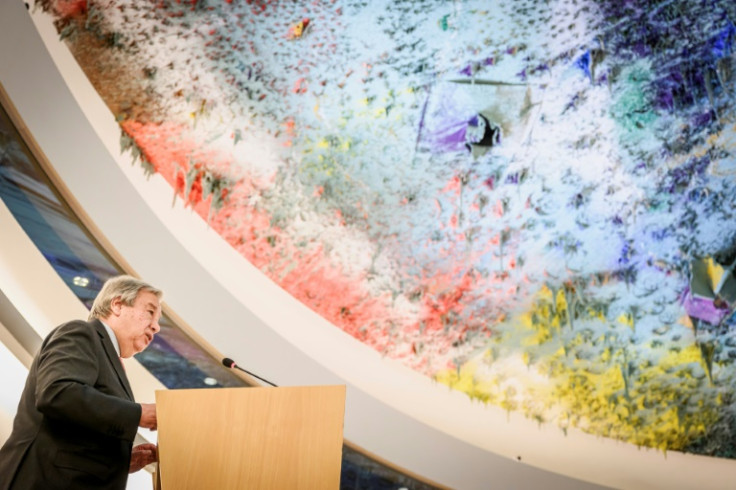Gaza Fate Under Scruinty At UN Rights Council

The "collective punishment" of civilians in Gaza was not justifiable, the UN chief told the Human Rights Council on Monday, amid mounting fears of an Israeli invasion of Rafah.
UN Secretary-General Antonio Guterres said that Rafah, Gaza's southernmost city where more than 1.4 million Palestinians are crowded together in tent cities, was "the core of the humanitarian aid operation" in the Palestinian territory.
"An all-out Israeli offensive on the city would not only be terrifying for more than a million Palestinian civilians sheltering there; it would put the final nail in the coffin of our aid programmes," he said.
His comments came after Israeli Prime Minister Benjamin Netanyahu on Sunday said that, despite ongoing talks toward a ceasefire, Israel's army will launch a ground invasion of Rafah to achieve "total victory" over Hamas.
The war broke out after Hamas's unprecedented October 7 attack, which resulted in the deaths of about 1,160 people in Israel, mostly civilians, according to an AFP tally of official figures.
Hamas militants also took about 250 hostages, 130 of whom remain in Gaza, including 31 presumed dead, according to Israel.
Israel's retaliatory offensive has killed nearly 30,000 people, mostly women and children, according to the latest tally by the health ministry in Hamas-run Gaza.
While "nothing can justify Hamas's deliberate killing, injuring, torturing and kidnapping of civilians, the use of sexual violence," Guterres said, "nothing justifies the collective punishment of the Palestinian people."
Ministers from a long line of countries took the rights council floor in Geneva to decry the "catastrophic" situation in the Gaza Strip.
Some, including the foreign ministers of Iran and Cuba, went further, slamming Israel's "genocide" in Gaza.
UNRWA, the main UN aid agency for Palestinians, has urged political action to avert a famine.
Guterres warned that "humanitarian aid is still completely insufficient" while repeating calls for a humanitarian ceasefire and unconditional release of hostages.
UNRWA has faced accusations of "collusion" with the Hamas militants during their October 7 attack, and has been the target of a campaign by Israel and its allies to shut it down.
The UN has launched investigations into the allegations, but has insisted there is no alternative to the agency at the forefront of aid delivery in Gaza.
On the sidelines of the council session, a pro-Israeli NGO, UN Watch, hosted a "summit" Monday "for a future beyond UNRWA".
Attending that event was Ayelet Samerano, whose son Yonatan was murdered by Hamas on October 7, and who accuses an UNRWA employee of carrying away his body to Gaza.
"For me there is only one decision. UNRWA has no reason to exist. UN: clear your house."
Speaking before the council, Palestinian foreign minister Riad al-Malki meanwhile slammed Israel for "censoring UNRWA... which allows our people in Gaza to survive".
In his address, UN rights chief Volker Turk lamented widespread disinformation and other attacks aimed to "undermine the legitimacy" of UN agencies.
"This is profoundly destructive," he said, adding that "UN humanitarian agencies assist hundreds of millions of people to stay alive".
Guterres also condemned the UN Security Council for failing to act on his calls to take all measures to "end the bloodshed in Gaza and prevent escalation".
As one of five permanent members of the 15-strong council, the United States -- Israel's biggest ally -- has a veto that it has wielded three times so far to bar the body from calling for an immediate ceasefire in Gaza.
Guterres warned of the consequences of the council's lack of action on Gaza, and its failure, due to a Russian veto, to act on the war in Ukraine.
This inaction "has severely -- perhaps fatally -- undermined its authority", he said, urging "serious reform".
© Copyright AFP 2024. All rights reserved.











